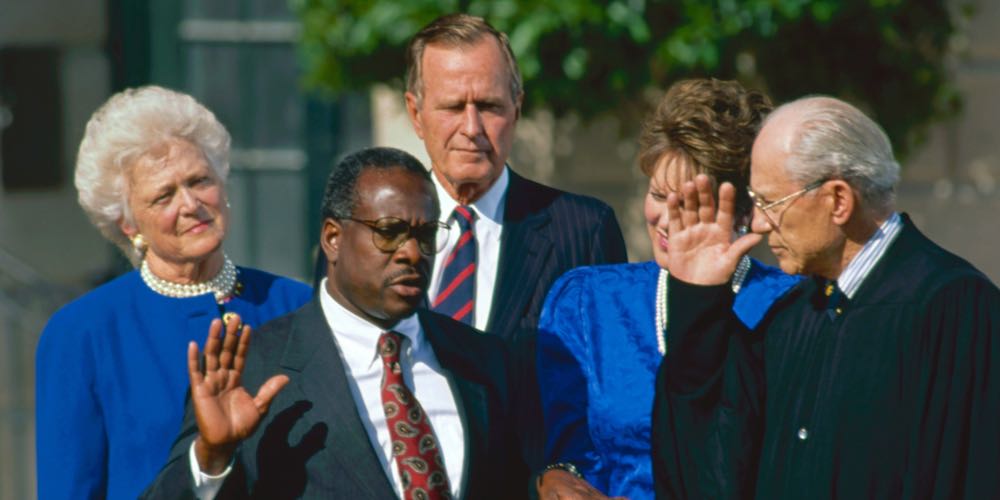An originalist approach to due process can take several forms, and Justice Gorsuch's "surprise" decision in Dimaya v. Sessions reinforces this.
A Legacy of Equal Justice
On June 22, 2022, the United States Supreme Court issued its decision for Dobbs v. Jackson Women’s Health Organization, overturning both Roe v. Wade and Planned Parenthood v. Casey. Although many conservatives and pro-life advocates expected such a result, some on the right were (to put it mildly) pleasantly surprised. The left now dominates the mainstream media and universities, and has even made tremendous inroads into the military, police, and the business world. It had seemed that it would achieve full-spectrum political and cultural dominance for most of the twenty-first century. A victory of this magnitude for conservatives seemed almost too good to be true.
The left likewise was preparing for a pro-life victory; however, many progressives appear, like their conservative counterparts, not to have anticipated the reality that abortion would soon become limited and even entirely illegal throughout much of the United States. Some of the harder or edgier conservatives and populists have reveled in Dobbs-inspired TikTok meltdowns and violent protests that would embarrass earlier generations of progressive activists.
While the majority opinion of Dobbs was authored by Justice Samuel Alito, another justice has served as the primary target of the left’s anger: Clarence Thomas. News agencies report that a MoveOn.org petition urging the impeachment of Justice Thomas has reached nearly one million signatures. A perpetual bête noir of the left, Thomas recently has been subjected to racist attacks upon him and his wife Virginia “Ginni” Thomas. Such rhetoric from the political left may seem odd, given the perpetual gauchiste worry over the proper language used to describe people of color, but Justice Thomas has always been fair game for insult and innuendo. Even before the 1991 Anita Hill hearings, Justice Thomas was the target of media scorn as a black conservative member of the Reagan administration, serving as head of the EEOC from 1982-1990. However, as revealed in a recent series of interviews, collected and edited by Michael Pack and Mark Paoletta, much of Clarence Thomas’s life has been marked by overcoming insults and prejudice from his fellow Americans, black and white, liberal and conservative, Northern and Southern.
A companion to the 2020 two-hour documentary of the same name, Created Equal: Clarence Thomas in His Own Words contains a series of interviews with Justice Thomas (as well as a shorter set of interviews with his wife, Ginni), chronicling Thomas’s rise from his early days in a Gullah Geechee family in Pin Point, Georgia to his apogee as one of the most influential Supreme Court Justices of the twenty-first century.
Thomas was born on July 23, 1948, three years after the end of World War II and six years before the 1954 Brown v. Board of Education, which began the process of overturning state mandated racial segregation of schools. His parents divorced when he was three years old, and young Clarence bounced around with relatives for some years before landing with his grandparents, Myers and Christina Anderson in Savannah.
His grandfather Myers became one of the most important figures in Clarence Thomas’s life, inspiring Justice Thomas to pen his 2007 memoir, My Grandfather’s Son. The grandson of freed slaves, Myers was a lifelong member of the NAACP. Myers would make young Clarence come with him to meetings and would use his property to bail out civil rights protesters. However, Myers’s goal, which inspired his grandson, was not the radical overthrow of America, destruction of “whiteness,” or revenge against the wrongs his ancestors suffered. Rather, it was the long and hard and slow work of achieving justice and equality before the law. These values would help shape young Thomas as well as the decisions of the later Supreme Court Justice.
The school uniforms and rhythm of Catholic schooling left a deep impression on Thomas, who would later leave and then return to his childhood faith.
Thomas’s grandfather also taught him the value of hard work and discipline. Myers Anderson was an oil truck driver who lived modestly and frugally, which may have inspired Thomas’s own later leanings toward libertarianism. Thomas saw the fruits of this hard work in the well-kept and clean house with the joys of mid-twentieth-century conveniences. He further learned the value of physical labor working on a farm with his grandfather. Throughout Created Equal, Thomas boasts of the skills he learned as well as the proverbs drilled into him by his grandfather. His grandfather set an example for him, telling him, “I’m going to tell you to do as I do, not as I say.” If Clarence or his brother did something foolish, Myers would say, “You know what boy? I’m a ship your head off to J. Edgar Hoover to see what’s wrong with your brain.” Justice Thomas thus implicitly ribs those among the Washington elite who have not worked with their hands in their entire life and thus are, for this reason and many others, completely out of touch with everyday Americans.
Clarence Thomas’s grandparents were Catholic, and he was sent to Catholic schools at an early age. In Created Equal, Thomas praises the nuns, who unlike later “champagne socialists” and “do as I say, not as I do” liberals lived with the poor black Americans whom they served, teaching and loving them as children of God, not, in the words of Thomas Sowell, as “pets and mascots.” Indeed, service to the black community earned the Irish nuns the derogatory appellation, the “n[expletive delete] nuns.” The school uniforms and rhythm of Catholic schooling left a deep impression on Thomas, who would later leave and then return to his childhood faith.
Although he did not encounter direct, violent racism in the South, Clarence notes that he did encounter some dirty looks and comments when segregation began to be lifted. Like many black scholars of both the left and right, Thomas, although condemning segregation, notes that one of its consequences was a sense of solidarity and safety in the Southern black community. Like many conservative black scholars, Thomas further comments on how the black community was destroyed by liberal policies that broke up the cohesiveness of the black community. Thomas does not, however, paint a rosy colored view of black America. As a kid, he was teased by other blacks for having such a dark complexion.
Thomas’s mind was shaped by his reading of black novelists such as Richard Wright and Ralph Ellison as well as the works of Ayn Rand, which developed the individualist streak in the future Supreme Court justice.
As is commonly known, Clarence Thomas spent time in a Catholic seminary where he learned how to pray and formed friendships, but where he also encountered crass racism from classmates, which contributed to a period he spent away from the Church. Thomas was told by a priest that he needed to speak standard English—something that hurt him but which also shaped his worldview. Clarence learned that education in the Western tradition was not something that destroyed his identity as a Southerner or as a black man, but it was something that complimented it and enabled his later success. Moreover, the seminary further taught him the importance of hard work in academia and in intellectual matters, further preparing him for the rigors of life on the Supreme Court. However, he also heard one of his classmates refer to running back Jim Brown as “that n-word,” and was subject to other insults, which pushed him in a more radical direction.
Thomas eventually left the seminary and went to Holy Cross College in Worchester, MA where he increasingly became radicalized. Ironically, he encountered racism in the allegedly more tolerant North as well. At the time, he viewed life through a racial lens, and engaged in various experiments, such as creating black corridors and black dorms. Thomas was not impressed by this militancy, which differed from the values taught to him by his grandfather. Justice Thomas writes of his encounter with a Black Panther who came to Holy Cross, brandishing a gun in a dorm room. Justice Thomas explains his aversion to this militancy: “Boy, that showed me something. Not only was I not impressed, I mean, it was clear that this guy was not someone who was about to persuade you. And he was almost like a criminal.” In contrast, Thomas saw self-reliance as a way to propel the black community forward. One of Justice Thomas’s favorite speeches from Frederick Douglas encapsulates this view. The speech reads as follows:
The American people have always been anxious to know what they shall do with us…I have but one answer from the beginning. Do nothing with us! Your doing with us has already played the mischief with us. Do nothing with us! If the apples will not remain on the tree of their own strength, if they are worm-eaten at the core, if they are early ripe and disposed to fall, let them fall! …And if the negro cannot stand on his own legs! Let him alone!…Your interference is doing him positive injury.
In addition to Frederick Douglas, Thomas’s mind was shaped by his reading of black novelists such as Richard Wright and Ralph Ellison as well as the works of Ayn Rand, which developed the individualist streak in the future Supreme Court justice.
Thomas would later enter Yale Law School and then would begin a rightward drift, entering into politics in Missouri and then Washington, DC, eventually rising to his current position. During this time, Thomas was subject to ridicule from a host of rivals who made every effort to sabotage the career of an intelligent black conservative who refused to submit to the progressive ideals that have shaped many black leaders. As Created Equal narrates, Thomas further found a rock of support in his wife, Nebraska native, Ginni Lamp, whom he married in 1987. Thomas touchingly writes of Ginni: “She was a gift from God that I had prayed for.”
Throughout his life and career, Clarence Thomas has undergone a series of changes and adaptions. However, he has always been shaped by the ideals that were given to him by his grandfather and later enforced by the nuns of his parochial school. Hard work, honesty, fairness, piety, and a sense of justice have shaped the life and work of Clarence Thomas. However, throughout it all, he has remained his grandfather’s son.


